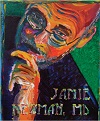Ignaz and Cassandra
Two voices called out warnings, but they fell on deaf ears.
He sits in his small hot room, head in his hands, and sighs. So many young women dying. So many newborns, too. His chief thinks the cause is that the hospital beds are too close or too far apart. His partner thinks it's clogged milk ducts, the impeded product of lactation accumulating inside the mother's womb. According to others, it's caused by miasmas or discombobulated humors or poverty itself. But none of this seems to be the answer. And still they die, night after night.

She paced nervously in her room, in a tower, in a walled city high on a hill. She had a choice to make. Who wouldn't want to know the future? It was in her grasp. She might not like what she would have to do to gain that power, but she was used to doing unpleasant things. This was just part of being royalty. She was the curly-haired, beautiful daughter of a powerful king. But she wanted more than that.
He spends his days looking for an answer, trying to prevent the seemingly inevitable curse of childbed fever. He comes to the hospital with the rising sun. He checks the rosters of the First Clinic of the Viennese Allgemeines Krankenhaus for the newly delivered and the newly deceased. Then he heads to the morgue. He does autopsy after autopsy. The women's bodies must hold an answer, but it remains elusive. Eventually he heads upstairs for rounds. So many mothers to care for and so many babies to bring squalling and kicking into the world, but how many will leave the building alive?
Cassandra, daughter of King Priam of Troy, finally made her choice. The god Apollo had promised her the gift of prophesy. With this ability, she could lead her father and his kingdom to greater glory. But there was a catch. She would have to couple with Apollo, and the thought made her apprehensive. She had lain with no man, and god or not, she did not want to change that yet.
One day his world changes. It's another death, but not a mother. His good friend and dissecting partner dies after being accidently stabbed by a dissecting scalpel. But the autopsy looks all too familiar, similar to the bodies of mothers dead from childbed fever, although this is not the case with his friend. What caused the death? Ignaz Semmelweis tugs on his straggly mustache and considers the possibilities.
When the time came, although she had obtained the gift of prophesy, she could not go through with the deal. And Apollo was furious with her duplicity. He left her with the gift but added a curse: She would be able to foretell the future, but nobody would ever believe her.
It comes to him like a vision. The blade of the scalpel stabbed his colleague, but on that blade were the remains of a cadaver. Had some kind of residue, a cadaver particle, entered through the cut and brought his death? And if this were so, are the autopsies they perform each day, with their hands wiped dry on crusted lapels, the source of death and misery? Are the cadaver particles catching a ride on their unwashed hands and being transported by exam into the waiting bodies of the postpartum patients?
She knew it was a mistake when her brother Paris left for Sparta, and she tried to stop him. He scoffed at her prediction. She also knew that disaster was coming when he returned to Troy with Helen, and she did her best to try to keep Helen from entering the gates, but people only laughed. And when she predicted the fall of Troy, they locked her up and called her insane.
He feels elated and ill at the same time. Has he been responsible? But at the same time he can stop it with the simple expedient of washing his hands until the smell of cadaver particle is gone. So simple! He just has to spread the word. But his conclusion falls on deaf ears. Women continue to die despite a simple solution. He is filled with despair. Many of his colleagues think he has gone insane and, soon, he will. It will be years until Oliver Wendell Holmes proves he was right, and Louis Pasteur shows the lives of cadaver particles he calls bacteria, and Joseph Lister finally makes surgery safer. If he could only have made them wash their hands, it would have been so simple to save a life.
She saw the giant wooden horse the Greeks had left behind. Without doubt, she knew that it was filled with soldiers and there would be death and slaughter that night. She pleaded, she begged, she tore her hair, but the horse rolled in to Troy, bearing death.
Cadaver particles and hidden soldiers—each time a voice called out a warning, but it fell on deaf ears.



